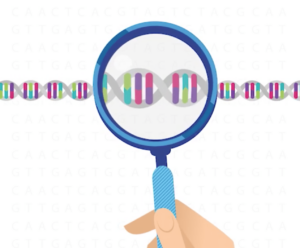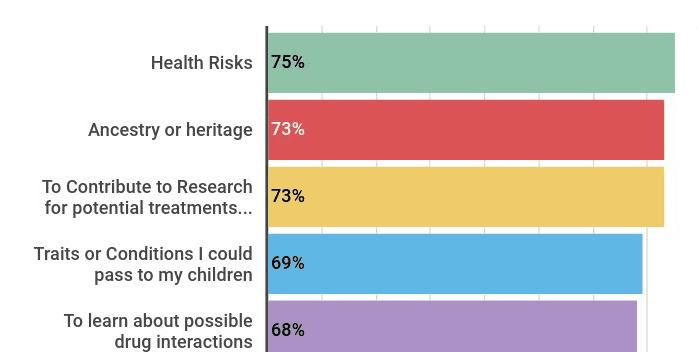A new national survey shows a keen interest in DNA testing primarily driven by people’s desire to know more about their potential health risks.
The survey, conducted by 23andMe in the lead up to DNA Day, asked consumers a range of questions to gauge both their understanding and interest in genetic testing.* Just as in all the surveys the company has done since 2013, a majority of consumers said they were interested in testing.
But this year saw a slight increase over last year in the percentage of respondents who said they were either extremely or somewhat interested in using DNA testing to find out about their health. The survey found that 74 percent were interested in testing to learn about health risks, which is a 3 percent increase over last year.
Potential Health Risks
Most striking of all is that learning about health risks drives the most interest in DNA testing. The survey found that two-thirds of respondents ranked health information as their top consideration for testing. Interestingly, the same percentage of those surveyed ranked their interest in ancestry information as those who said a desire to contribute to genetic research was a primary driver for their interest in testing.
“It’s encouraging to see consumers value the core of 23andMe’s mission,” said Jhulianna Cintron, 23andMe’s consumer genetics trends expert. “We want everyone to benefit from the science around the human genome, and that’s why health, ancestry and research have always been at the core of what we do.”

Learning about potential health risk was the primary driver in their interest in DNA testing, according to a new survey by 23andMe.
23andMe began conducting annual surveys measuring consumers’ interest in DNA testing in 2013. At that time, estimates were that fewer than half a million people had done an at-home DNA test. Since then interest in genetic testing has soared. One estimate suggests that more than 26 million people have taken an at-home DNA test. That surge in interest has come with references to testing sprinkled in popular culture, and daily news coverage.
Genetic Literacy
But people’s deep interest in genetic testing is often out ahead of their understanding of the science. The survey shows there is room for improvement in basic genetic literacy, which mirrors other national surveys that show a general need for science literacy.
23andMe’s 2019 survey found that fewer than half of those asked, 41 percent, knew that DNA is organized into chromosomes, for example. While most of those surveyed, 57 percent, understood that genetic research can help lead to new treatments for disease, only 39 percent knew that genetics can play a role in a person’s risk for Parkinson’s disease. More than 70 percent of those asked were unaware that a person’s genetics can impact how likely it is for them to have a stronger or weaker reaction to different medications.
While the survey found gaps in genetic literacy, it also showed a continued interest in leveraging genetic information to learn more about their own health. A majority of those surveyed, 62 percent, also said that information could help them make lifestyle changes to improve their health. And 66 percent said they would be interested in learning about genetic variants that they could pass on to their children that could increase the risk for certain diseases.
All in all the survey indicates that people’s interest in DNA testing remains strong, and it is not driven by just one thing, but a desire to learn not only about potential health risks, or their ancestral heritage, but also a willingness to contribute to important research that might help others. And no matter their motivation, the vast majority of Americans, 85 percent, said that they have a right to access their genetic information with an at-home genetic test directly.
*23andMe DNA Survey, conducted in April 2019. The online survey included 1,500 nationally representative Americans who were 18 years old or older. The margin of error is +/- 3 percent.